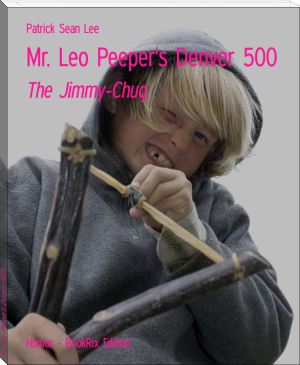The Head of Kay's by P. G. Wodehouse (romantic story to read .txt) 📗

- Author: P. G. Wodehouse
Book online «The Head of Kay's by P. G. Wodehouse (romantic story to read .txt) 📗». Author P. G. Wodehouse
"I should like to hear Fenn play that," said Challis. "You're awfully good, you know, Williams, but he might do it better still."
"Get him to play it as an encore at the concert," said Williams, starting for the fourth time.
The talented Fenn was also a musician,—not a genius at the piano, as he was at cricket, but a sufficiently sound performer for his age, considering that he had not made a special study of it. He was to play at the school concert on the following day.
"I believe Fenn has an awful time at Kay's," said Jimmy Silver. "It must be a fair sort of hole, judging from the specimens you see crawling about in Kay caps. I wish I'd known my people were sending young Billy there. I'd have warned them. I only told them not to sling him in here. I had no idea they'd have picked Kay's."
"Fenn was telling me the other day," said Kennedy, "that being in Kay's had spoiled his whole time at the school. He always wanted to come to Blackburn's, only there wasn't room that particular term. Bad luck, wasn't it? I don't think he found it so bad before he became head of the house. He didn't come into contact with Kay so much. But now he finds that he can't do a thing without Kay buzzing round and interfering."
"I wonder," said Jimmy Silver, thoughtfully, "if that's why he bowls so fast. To work it off, you know."
In the course of a beautiful innings of fifty-three that afternoon, the captain of Blackburn's had received two of Fenn's speediest on the same spot just above the pad in rapid succession, and he now hobbled painfully when he moved about.
The conversation that evening had dealt so largely with Fenn—the whole school, indeed, was talking of nothing but his great attempt to win the cricket cup single-handed—that Kennedy, going out into the road for a breather before the rest of the boarders returned from preparation, made his way to Kay's to see if Fenn was imitating his example, and taking the air too.
He found him at Kay's gate, and they strolled towards the school buildings together. Fenn was unusually silent.
"Well?" said Kennedy, after a minute had passed without a remark.
"Well, what?"
"What's up?"
Fenn laughed what novelists are fond of calling a mirthless laugh.
"Oh, I don't know," he said; "I'm sick of this place."
Kennedy inspected his friend's face anxiously by the light of the lamp over the school gate. There was no mistake about it. Fenn certainly did look bad. His face always looked lean and craggy, but tonight there was a difference. He looked used up.
"Fagged?" asked Kennedy.
"No. Sick."
"What about?"
"Everything. I wish you could come into Kay's for a bit just to see what it's like. Then you'd understand. At present I don't suppose you've an idea of it. I'd like to write a book on 'Kay Day by Day'. I'd have plenty to put in it."
"What's he been doing?"
"Oh, nothing out of the ordinary run. It's the fact that he's always at it that does me. You get a houseful of—well, you know the sort of chap the average Kayite is. They'd keep me busy even if I were allowed a free hand. But I'm not. Whenever I try and keep order and stop things a bit, out springs the man Kay from nowhere, and takes the job out of my hands, makes a ghastly mess of everything, and retires purring. Once in every three times, or thereabouts, he slangs me in front of the kids for not keeping order. I'm glad this is the end of the term. I couldn't stand it much longer. Hullo, here come the chaps from prep. We'd better be getting back."
II — AN EVENING AT KAY'S
They turned, and began to walk towards the houses. Kennedy felt miserable. He never allowed himself to be put out, to any great extent, by his own worries, which, indeed, had not been very numerous up to the present, but the misfortunes of his friends always troubled him exceedingly. When anything happened to him personally, he found the discomfort of being in a tight place largely counterbalanced by the excitement of trying to find a way out. But the impossibility of helping Fenn in any way depressed him.
"It must be awful," he said, breaking the silence.
"It is," said Fenn, briefly.
"But haven't the house-matches made any difference? Blackburn's always frightfully bucked when the house does anything. You can do anything you like with him if you lift a cup. I should have thought Kay would have been all right when he saw you knocking up centuries, and getting into the final, and all that sort of thing."
Fenn laughed.
"Kay!" he said. "My dear man, he doesn't know. I don't suppose he's got the remotest idea that we are in the final at all, or, if he has, he doesn't understand what being in the final means."
"But surely he'll be glad if you lick us tomorrow?" asked Kennedy. Such indifference on the part of a house-master respecting the fortunes of his house seemed to him, having before him the bright example of Mr Blackburn, almost incredible.
"I don't suppose so," said Fenn. "Or, if he is, I'll bet he doesn't show it. He's not like Blackburn. I wish he was. Here he comes, so perhaps we'd better talk about something else."
The vanguard of the boys returning from preparation had passed them, and they were now standing at the gate of the house. As Fenn spoke, a little, restless-looking man in cap and gown came up. His clean-shaven face wore an expression of extreme alertness—the sort of look a ferret wears as he slips in at the mouth of a rabbit-hole. A doctor, called upon to sum up Mr Kay at a glance, would probably have said that he suffered from nerves, which would have been a perfectly correct diagnosis, though none of the members of his house put his manners and customs down to that cause. They considered that the methods he pursued in the management of the house were the outcome of a naturally malignant disposition. This was, however, not the case. There is no reason to suppose that Mr Kay did not mean well. But there is no doubt that he was extremely fussy. And fussiness—with the possible exceptions of homicidal mania and a taste for arson—is quite the worst characteristic it is possible for a house-master to possess.
He caught sight of Fenn and Kennedy at the gate, and stopped in his stride.
"What are you doing here, Fenn?" he asked, with an abruptness which brought a flush to the latter's face. "Why are you outside the house?"





Comments (0)